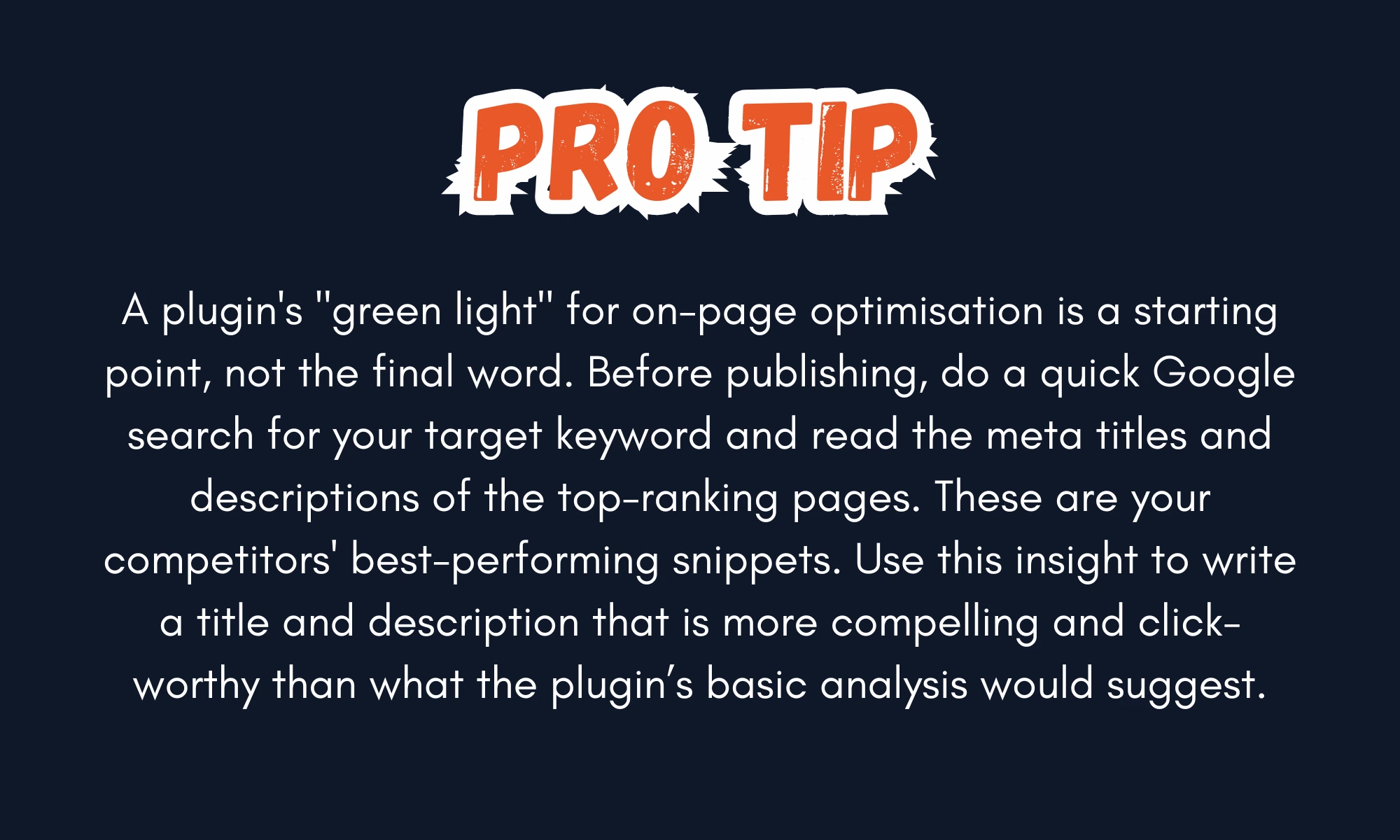The Critical Gap: What Your SEO Plugin Can't Tell You

In the world of website management, the promise of a simple solution to a complex problem is irresistible. For many business owners, a WordPress SEO plugin feels like that solution. With a few clicks and a handful of green lights, these tools promise to simplify the arcane art of search engine optimisation. They are presented as a one-stop shop for everything from meta titles to sitemaps, offering a sense of control and accomplishment.
But is that feeling of control real, or is it a carefully constructed illusion? The truth is, SEO plugins are invaluable tools, but they are just that - tools. They are the hammer and nails, not the architectural blueprint. Relying solely on a plugin to "do" your SEO is like believing you can build a skyscraper with a toolbox and no engineering plan.
This article will demystify the role of these plugins, celebrating their utility while exposing their critical limitations. Our goal is to empower you to use these tools effectively while understanding why a strategic, human-led approach is the key to true, long-term success.
At Appear Online, we believe in using the right tools for the job, but we never confuse the tool with the strategy. We provide the comprehensive SEO plan, the expert analysis, and the ongoing support that plugins simply cannot. If you've been relying on a plugin and have hit a ceiling in your organic growth, it's time to partner with an agency that can provide the strategic thinking and off-page efforts required to truly dominate your market. Contact us today for a free SEO audit, and let us show you what a complete, data-driven strategy can do for your business.

What an SEO Plugin Can (and Should) Do Exceptionally Well
Let’s be clear: a well-chosen SEO plugin is a powerful ally. It automates the tedious, technical tasks that are a prerequisite for good SEO. Here are the core functions where these tools shine:
- On-Page Optimisation at Your Fingertips: The most common function is providing a user-friendly interface to manage on-page SEO elements. This includes editing meta titles and descriptions, which are your website's first impression in the search results. A good plugin provides a snippet preview, allowing you to see exactly how your page will look on Google before you publish. This simple feature helps you write compelling, click-worthy titles and descriptions that can dramatically improve your click-through rates.
- Technical SEO Automation: Underneath the surface, SEO plugins are doing crucial work. They automatically generate XML sitemaps, which act as a roadmap for Google, guiding its crawlers to all your important content. They can also manage your robots.txt file, telling search engines which pages to crawl and which to ignore, thereby helping to optimise your crawl budget. For those with a growing site, this automation is invaluable.
- Schema Markup Made Easy: Structured data, or schema markup, helps search engines understand the context of your content. Implementing it manually can be complex, but plugins simplify this process with built-in schema generators. They allow you to add rich snippets for articles, reviews, products, and FAQs, giving your content a better chance of standing out with eye-catching results in the SERPs.
.webp)
Head-to-Head: A Look at the Top Contenders
With thousands of SEO plugins available, a few have risen to the top. While they all perform the basic functions, their philosophies and features differ.
- Yoast SEO: For years, Yoast was the undisputed champion. It’s known for its user-friendly "traffic light" system, which provides a clear checklist of on-page improvements. Its readability analysis is a standout feature, helping content creators write in a style that is accessible to a wider audience. Yoast’s focus has always been on providing a simple, guided experience.
- Rank Math: The younger, more agile competitor, Rank Math, has gained significant traction by adopting a "Swiss Army knife" approach. It offers a wider range of features in its free version, including a redirect manager, advanced schema types, and more robust analytics integrations. Rank Math is often praised for its ability to consolidate several different plugins into one, reducing site bloat and speeding up performance.
- AIOSEO & SEOPress: Other strong players like All in One SEO (AIOSEO) and SEOPress also have dedicated followings. AIOSEO is known for its incredibly simple setup wizard, making it a favourite for beginners, while SEOPress offers a clean, ad-free experience with a strong focus on privacy and performance.
.webp)
The Critical Gap: Where Plugins Fall Short
This is the most crucial part of our discussion. While a plugin can confirm if you’ve used your target keyword in your meta description, it cannot tell you if that keyword is the right one to target. This is the chasm between a tool and a strategy.
Here are the critical areas where SEO plugins are blind and an expert human is non-negotiable:
- Strategic Keyword Research & Intent Analysis: A plugin can score your content for a keyword you've chosen, but it offers no insight into whether that keyword has a high search volume, a realistic chance of ranking, or, most importantly, if it aligns with your customer's search intent. A plugin cannot perform a competitor analysis to see what keywords your rivals are ranking for and where the gaps in the market are. This is the strategic work that a professional agency like Appear Online handles, using advanced tools and expert analysis to build a keyword plan that drives real business results.
- Building Off-Page Authority: Google's algorithm relies heavily on backlinks - links from other reputable websites that act as votes of confidence. A plugin has no ability to build these links for you. It's an entirely off-page activity that requires outreach, relationship-building, and a comprehensive strategy. This is a huge, critical part of SEO that exists entirely outside the plugin's ecosystem.
- Holistic Content & Business Strategy: A plugin's green light for "readability" is no substitute for compelling, genuinely useful content that answers a user's question. A plugin can't develop a content calendar based on your business's seasonal trends, or map a user's journey from a top-of-funnel blog post to a bottom-of-funnel service page. That requires a deep understanding of your business goals and audience, something no piece of software can ever replicate.
- Technical SEO Beyond the Basics: While a plugin handles some technical aspects, it can't fix fundamental site architecture issues, resolve crawl budget problems on a large site, or diagnose complex server-side errors. It's a front-end assistant, not a back-end engineer.
.webp)
Conclusion: A Tool, Not the Solution
SEO plugins are not the enemy of good SEO. In fact, they are a powerful resource that can automate many of the essential, repetitive tasks. For small businesses with a limited budget, they are an excellent starting point.
However, it is a dangerous fallacy to believe that a plugin provides a complete SEO solution. True, sustainable SEO success is a combination of technical perfection, strategic foresight, and relentless effort - much of which happens far beyond the confines of a WordPress dashboard.
.avif)
.webp)
.webp)

.webp)
.webp)


